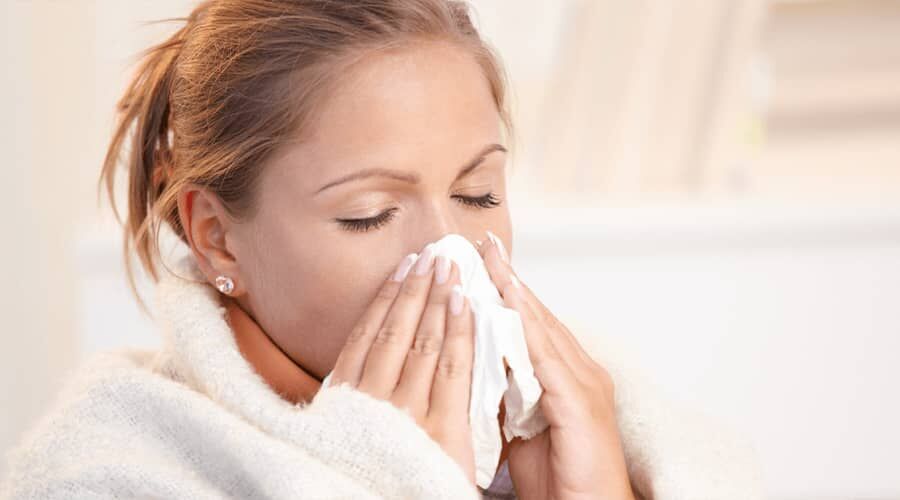
The common cold is a viral respiratory illness usually caused by rhinoviruses, coronaviruses and other viruses.
Symptoms of a cold include stuffy nose, runny nose, sneezing, sore throat, cough, headache and weakness. Colds are usually a mild illness but can be uncomfortable and usually last for 1-2 weeks. The immune system is the body’s defence system against foreign substances such as viruses, bacteria and other micro-organisms.
The immune system is a complex system with two main branches: adaptive and general immunity.
General immunity: general immunity is the immune system’s rapid and general defence response against various pathogens. It includes the physical barrier of the skin and mucous membranes, as well as primary defence cells such as white blood cells that respond rapidly to infections.
Adaptive immunity: adaptive immunity is a specific and long-lasting immune response that the body develops during infections. It involves T cells and B cells that can recognise and attack specific pathogens. Adaptive immunity has memory capacity, so the body remembers previous infections and responds to them more quickly and effectively.
Protection against colds depends mainly on the immune system.
The immune system has to fight the virus that causes a cold and remember it through adaptive immunity so that it can defend against it more effectively in the future. The strength and effectiveness of the immune system depends in part on genetic factors and lifestyle, such as proper nutrition, sufficient sleep and stress management.
Sore throat and coughing are common symptoms of upper respiratory infections such as colds or flu.
These symptoms are usually caused by viruses and usually go away on their own over time.
Here are some ways and tips to relieve sore throats and coughs:
1. Rest: The body needs rest to heal, so try to take more time to sleep and relax.
2. Drinking enough fluids: hydration can help relieve sore throats and thin phlegm during coughing. Warm tea, water, hot soup and hydrated drinks can help.
3. Honey: spooning warm honey water or honey can help relieve a sore throat and reduce coughing. Honey also has anti-inflammatory properties.
4. Throat rinse: A throat rinse made with salt and warm water can help relieve a sore throat. Throat rinses available from pharmacies can also be useful.
5. Sucking lozenges or sweets: Sucking lozenges can help relieve a sore throat, and sugar-free versions can also be helpful.
6. Medicines: there are a number of over-the-counter cough and sore throat medicines that can help relieve symptoms.
7. Humidification: warm humidification can help relieve sore throats and coughs. You can use a vaporizer in your bedroom or take a hot shower.
8. Hot drinks: Drinking hot drinks such as teas and soups can help relieve symptoms and stop sore throats.
9. Lung exercises: if coughing makes it difficult to breathe, you can do light lung exercises to help loosen and expel phlegm in the respiratory system.
If your symptoms are severe or last for a long time, or if they are accompanied by severe shortness of breath or fever, seek medical advice. Your doctor can help you determine whether further treatment, such as antibiotics or other medicines, is needed.

How can balms help with upper respiratory tract infections?
Breath-relieving effect: balms may contain essential oils such as eucalyptus, mint or chamomile, which can help clear the airways and relieve nasal congestion. Inhaling them or massaging them onto the face or chest can help ease breathing.
Anti-inflammatory properties: some ingredients in balms, such as chamomile or arnica, may have anti-inflammatory properties that can relieve sore throats and irritation.
Calming effect: balms can also have a calming effect, helping the patient to relax and sleep better. Essential oils and other ingredients can have a relaxing effect.
The natural herbal extracts and essential oils in PulmoFresh balm can help ease breathing, soothe coughs and relieve the unpleasant symptoms of colds.
PulmoFresh herbal balm is recommended for colds, coughs and cold symptoms!
Instructions for use
For massage, rubbing in
It is recommended to use 3-5 times a day, using a finger-sized amount. The balm should be applied to the chest and back area, then massaged and rubbed in thoroughly. It is more effective before going to bed, as the essential oils released by the balm, when inhaled, promote restful sleep
For inhalation
Add 1 teaspoon of PulmoFresh balm to half a litre of hot water and mix well. This will create a vapour which should be inhaled for about 20 minutes.

